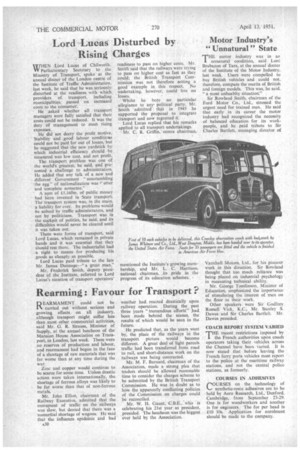Lord Lucas Disturbed by
Page 32

If you've noticed an error in this article please click here to report it so we can fix it.
.Rising Charges
WHEN Lord Lucas of Chilwortls, VI' Parliamentary Secretary to the Ministry of Transport, spoke at the annual dinner of the London centre of the Institute of Traffic Administration, last week, he said that he was seriously disturbed at the readiness with which providers of transport, including municipalities, passed on increased costs to the consumer.
He asked whether all transport managers were fully satisfied that their costs could not be reduced. It was the duty of management to meet rising expenses.
He did not decry the profit motive. Stability and good labour conditions could not be paid for out of losses, but he suggested that the new yardstick hywhich industrial efficiency should be measured was low cost, and not profit.
The transport problem was one of the world's greatest. he said. and presented a challenge to administration. He added that any talk of a new and different Government "unscrambling the egg S' of nationalization was =' utter and complete nonsense."
' A sum of £1,160m. of public money had been invested in .State transport. The transport system was, in the main. a liability for ever. Its problems would be solved by traffic administrators, and not by politicians. Transport was in the cockpit of politics, he said, and its difficulties would never be cleared until it was taken out.
There were forms of transport, said Lord Lucas. which remained in private hands and it was essential that they should rest there. The industrialist had a right to means for producing his goods as cheaply as possible.
Lord Lucas paid tribute to the late Mr. James Dunnage—" a great man."
Mr. Frederick Smith, deputy president itf the Institute, referred to Lord Lucas's mention of transport operators' readiness to pass on higher costs. Mr. Smith said that the railways were trying to pass on higher cost as fast as they could; the British Transport Commission was not therefore setting a good example in this respect. No undertaking, however, could live on losses.
Whilst he bore no particular allegiance to any. political party. Mr. Smith admitted-that in 1945 he supported the proposal to integrate transport and now regretted it.
Lord Lucas replied that his remarks applied to all transport undertakings. Mr. C. R. Griffin, centre chairman,
mentioned the Institute's growing membership, and Mr. L. C. Harrison, national chairman. its pride in the• progress of its education schemes.












































































